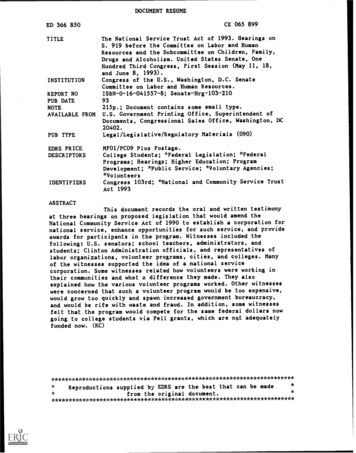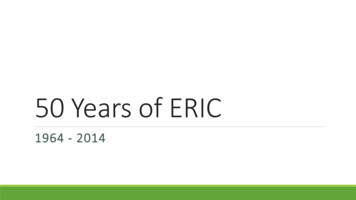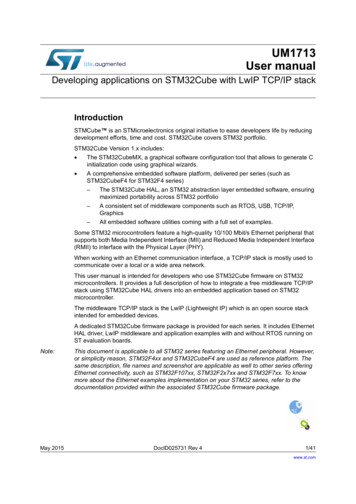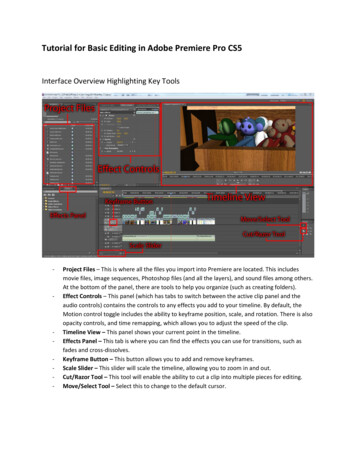
Transcription
DOCUMENT RESUMECE 065 899ED 366 850TITLEINSTITUTIONREPORT NOPUB DATENOTEAVAILABLE FROMThe National Service Trust Act of 1993. Hearings onS. 919 before the Committee on Labor and HumanResources and the Subcommittee on Children, Family,Drugs and Alcoholism. United States Senate, OneHundred Third Congress, First Session (May 11, 18,and June 8, 1993).Congress of the U.S., Washington, D.C. SenateCommittee on Labor and Human Resources.ISBN-0-16-041557-8; Senate-Hrg-103-21093215p.; Document contains some small type.U.S. Government Printing Office, Superintendent ofDocuments, Congressional Sales Office, Washington, DC20402.PUB TYPELegal/Legislative/Regulatory Materials (090)EDRS PRICEDESCRIPTORSMF01/PC09 Plus Postage.College Students; *Federal Legislation; *FederalPrograms; Hearings; Higher Education; ProgramDevelopment; *Public Service; *Voluntary Agencies;*VolunteersCongress 103rd; *National and Community Service TrustAct 1993IDENTIFIERSABSTRACTThis document records the oral and written testimonyat three hearings on proposed legislation that would amend theNational Community Service Act of 1990 to establish a corporation fornational service, enhance opportunities for such service, and provideawards for participants in the program. Witnesses included thefollowing: U.S. senators; school teachers, administrators, andstudents; Clinton Administration officials, and representatives oflabor organizations, volunteer programs, cities, and colleges. Manyof the witnesses supported the idea of a national servicecorporation. Some witnesses related how volunteers were working intheir communities and what a difference they made. They alsoexplained how the various volunteer programs worked. Other witnesseswere concerned that such a volunteer program would be too expensive,would grow too quickly and spawn increased government bureaucracy,and would be rife with waste and fraud. In addition, some witnessesfelt that the program would compete for the same federal dollars nowgoing to college students via Pell grants, which are not adequatelyfunded now. *************************Reproductions supplied by EDRS are the best that can be madefrom the original ******************************
S. HRO. 103-210THE NATIONAL SERVICE MST ACT OF 1993HEARINGSBEFORE THECOMMITTEE ONLABOR AND HINIAN RESOURCESSUBCOMMITTEE ON CHILDREN, FAMILY DRUGSAND ALCOHOLISMUNITED STATES SENATEONE HUNDRED THIRD CONGRESSFIRST SESSIONONS. 919TO AMEND THE NATIONAL COMMUNITY SERVICE ACT OF 1990 TO ESTABLISH A CORPORATION FOR NATIONAL SERVICE, ENHANCE OPPORTUNITIES FOR NATIONAL SERVICE, AND PROVIDE NATIONAL SERVICEEDUCATIONAL AWARDS TO PERSONS PARTICIPATING IN SUCH SERVICE, AND FOR OTHER PURPOSESMAY 11, 18, AND JUNE 8, 1993Printed for the use of the Committee on Labor and Human ResourccsU.S. DEPARTMENT OF EDUCATIONOffice of Educational Research and ImprovementEDUCATIONAL RESOURCES INFORMATIONCENTER (ERIC);c/hisdocument has been reproduced alkreceived from the person or organizationoriginating itC Minor changes have been made to improvereproduction qualityPoints ot view or opinions stated in this docu.ment do nOt necessarily represent officialOE RI position or pohcyU.S. GOVERNMENT PRINTING OFFICE72-268teWASHINGTON : 1993For sale by the U.S. Government Printing OfficeSuperintendent of Documents. Congressional Sales Office. Washington. IX' 20402ISBN 0-16-041557-82BEST COPY AVAILAUE
COMMITTEE ON IABOR AND HUMAN RESOURCESEDWARD M. KENNEDY, Massachusetts, ChairmanNANCY LANDON KASSEBAUM, KansasCLAIBORNE PELL, Rhode IslandJAMES M. JEFFORDS, VermontHOWARD M. METZENBAUM, OhioDAN COATS, IndianaCHRISTOPHER J. DODD, ConnecticutJUDD GREGG, New HampshirePAUL SIMON, IllinoisSTROM THURMOND, South CarolinaTOM HARKIN, IowaORRIN G. HATCH, UtahBARBARA A. MIKULSKI, MarylandDAVE DURENBERGER, MinnesotaJEFF BINGAMAN, New MexicoPAUL D. WELLSTONE, MinnesotaHARRIS WOFFORD, PennsylvaniaNICK LITTLEFIELD, Staff Director and Chief CounselSUSAN K. HATTAN, Minority Staff DirectorSUBCOMMITTEE ON CHILDREN, FAMILY, DRUGS AND ALCOHOLISMCHRISTOPHER J. DODD, Connecticut, ChairmanDAN COATS, IndianaCLAIBORNE PELL, Rhode IslandNANCY LANDON KASSEBAUM, KansasBARBARA A. MIKULSKI, MarylandJAMES M. JEFFORDS, VermontJEFF BINGAMAN, New MexicoJUDD GREGG, New HampshireEDWARD M. KENNEDY, MassachusettsSTROM THURMOND, South CarolinaPAUL D. WELLSTONE, MinnesotaDAVE DURENBERGER, MinnesotaHARRIS WOFFORD, PennsylvaniaRICHARD J. TARPLIN, Staff DirectorSTEPHANIE JOHNSON MONROE, Counsel3
CONTENTSSTATEMENTSMAY 11, 1993Kennedy, Hon. Edward M., a U.S. Senator from the State of Massachusetts,prepared statementKassebaum, Hon. Nancy Landon, a U.S. Senator from the State of Kansas,prepared statementResponses to questions:116. MiltonSecretary BabbittPell, Hon. Claiborne,a U.S. Senator from the State of Rhode IslandMetzenbaum, Hon. Howard M., a US. Senator from the State of OhioDurenberger, Hon. Dave, a U.S. Senator from the State of Minnesota, prepared statementBabbitt, Hon. Bruce, Secretary, US. Department of the Interior, preparedstatementJefrorde, Hon. James M., a U.S. Senator from the State of VermontMerced, Ada Liz, sophomore at Roger L Putnam Vocational/Technical HighSchool, Springfield, MA; accompanied by Dennis Brunton, community learning facilitation teacher; and Mary Noble, eighth grade teacher and assistantprincipal, Webster Open School, Minneapolis, 11114, accompanied by RobertHurt, student, prepared statementMcEntee, Gerald, president, American Federation of State, County and Municipal Employees, AFL--CIO, and Catherine Milton, executive director,Commission on National and Community Service, prepared statementPage13636410101114253949ADDITIONAL MATERIALArticles, publications, letters, etc.:Statement of Donald J. Eberly60MAY 18, 1993Dodd, Hon. Christopher J., a U.S. Senator from the State of Connecticut67Office of National Service, prepared statementDurenberger, Hon. Dave, a U.S. Senator from the State of Minnesota,Goolsby, Margaret, former VISTA, Central Brooklyn Federal Credit Union,Brooklyn, NY; W. William Cegelka, VISTA, Windham Area CommunityAction Program, Windham, CT, and Kathleen Wilken, VISTA, Way to GrowPropram, Minneapolis, MN, prepared statementParry, CoL, Frank, chairman of the board, Retired Senior Volunteer Program,Montgomery County, PA; Wilhelmenia ?dayden, Foster Grandparent, Emily69Edelman, Peter B., counselor to the Secretary, US. Department of Healthand Human Services, Washington, DC, and senior adviser, White House57381Price Jones Head Start Center, Baltimore, MD; Edith Courville, seniorcompanion to Hilda Corbi n Worcester, MA; and Helen Fiske, daughterof IllIda Corbin, Leicester, MA, prepared statement105ADDITIONAL MATERIALArticles, publications, letters, etc.:Statements:Mr. Rasmussen118
PateArticles, publications, letters, etc.ContinuedStatementsContinued126128Mr. GurrMs. PantosJUNE 8, 1993Wofforcl, Hon. Harris, a U.S. Senator from the State of PennsylvaniaEspy, Hon. Michael, Secretary, U.S. Department of Agriculture, Washington,DCMikulski, Hon. Barbara A., a U.S. Senator from the State of Maryland,prepared statementCoats, Hon. Dan, a US. Senator from the State of IndianaDodd, Hon. Christopher J., a U.S. Senator from the State of Connecticut,prepared statementPell, Hon. Claiborne, a U.S. Senator from the State of Rhode Island, preparedstatementOlmos, Edward James, actor, Los Angeles, CA; Franco Harris, ex-professionalfootball player, Pittsburgh, PA, and Ceolric Parker, Pennsylvania Conservation Corps, Erie, PAPrepared statements:111r. OlmosMr. ParkerAndreas, Dwayne 0., chairman and chief executive officer, Archer DanielsMidland Co., Miami Beach, FL; J. Richard Munro, chairman, board ofdirectors, The Points of Light Foundation, New York, NY,- Jeffrey Swartz,131132136139140142144145149chief operating officer, Timberland Co., Hampton, NH; and SandraBroadwater, Volunteer Maryland coordinator, Baltimore, MDPrepared statements:11/r. Andreas (with attachments)Mr. MunroMr. Swartz (with an attachment)Ms. BroadwaterMalloy, Rev. Edward A., C.S.C., president, University of Notre Dame, SouthBend, IN; Sue Donaldson, council member, city of Seattle, Seattle, WA;and Kenneth Bailey, COOL Road Scholar, St. Louis, MOPrepared statements:Reverend MalloyMs. DonaldsonMr. Bailey163170174179184186190193ADDITIONAL MATERIALArticles, publications, letters, etc.:Statement of General SchwarzkopfDemocratic Presidential candidate Gov. Bill Clinton's address at the University of Notre Dame, South Bend, IN, September 11, 19925159200
THE NATIONAL SERVICE TRUST ACT OF 1993TUESDAY, MAY 11, 1993U.S. SENATE,COMMITTEE ON LABOR AND HUMAN RESOURCES,Washington, DC.The committee met, pursuant to notice, at 10:35 a.m., in roomSD-430, Dirksen Senate Office Building, Senator Kennedy (chair-man of the committee) presiding.Present: Senators Kennedy, Pell, Metzenbaum, Mikulski,Wel !stone, Wofford, Kassebaum, Jeffords, Gregg, and Durenberger.OPENING STATEMENT OF SENATOR KENNEDYThe CHAIRMAN. We'll come to order.We want to thank all the representatives of the various servicecorps from different communities around the country for their attendance here today. We're going to do our best to accommodate allof them; perhaps if our good friends in the press could move forward, we'll violate the fire laws for just a few hours this morningand permit our young volunteers to join us.We apologize to our witnesses. We planned to start our hearingat 10:30, and at 9:30, the Foreign Relations Committee and theArmed Services Committee, of which I am a member also, held important hearings. So we have done the best we could to try and accommodate the different members' interests, and thus we'll moveas quickly as possible to the witnesses now.Today, we will be hearing testimony in support of the President'sprogram on voluntary national service. I think all of us understandthat one of the fundamental core values of our society has been voluntary service. This value dates to the founding of our country.Our Nation has always been at its best when it has served others.All of us are very mindful of the strong commitment that President Clinton has to this issue. He has elevated national service toone of his priorities as the President of the United States. It is anissue which drew bipartisan support in 1990 when this committeedeveloped national and community service legislation. And Republicans and Democrats alike have been strongly committed not onlyat the national level, but at the State and local levels as well.So it is i1i that spirit that we consider the President's proposal,and we are delighted to have the Interior Secretary with us, butbefore hearing from him, I will submit my full statement for therecord and recognize Senator Kassebaum.[The prepared statement of Senator Kennedy follows:](1)
2P4EPARED STATEMENT OF SENATOR KENNEDYIn today's hearing, we consider one of President Clintun's mostimportant proposals to build a stronger future for theNation . . . his plan for national service. National service calls onAmericans to take greater responsibility for their own communities.The fashion today is for too many Americans to blame the problems of their communities on others. We must find more effectiveways to encourage citizens to become more involved themselves insolving vexing local issues. Participation of citizens is the touchstone of a viable democracy. It is the only realistic way to transform the life of the community.The concept of service to others is as old as America. The spiritthat enabled thirteen quarreling colonies to transform themselvesinto a new nation and meet other historic challenges of the pastmust be rekindled in America today.A generation ago, President Kennedy inspired the Nation withthe famous phrase in his inaugural address, "Ask not what yourcountry can do for youask what you can do for your country."That phrase still summons us across the years. To build a strongcommitment to service today, in our generation, we must start withthe Nation's youth, and that is what President Clinton's plan does.The National Service Trust Act gives Americans of all ages opportunities for service. School-based and community-based servicelearning programs will be available to students in grades K-12.College-based programs will bring the concept of service into academic courses and extra-curricular projects. Full-time and part-time stipends will enable individuals to work in worthwhileprojects in their own communities. Older American Programs willtap senior citizens for service.In ways like this, The National Service Trust Act will open upa range of new opportunities for citizens to become agents ofchange in their own communities. It will give them opportunitiesto gain valuable skills while serving others. And it will give themopportunities for access to education, and job training to reachtheir full potential. Our goal is to invest in those who invest theirown time and energy in their own neighborhoods.Today, we will hear from the administration, and from witnesseswho are currently engaged or were recently engaged in service. Wewill also hear how the ideas in this legislation relate to existing organizations and programs. The bipartisan National and Community Service Act of 1990 laid the groundwork for this initiative, andwe entrust to do our best to build on it.It is a special privilege to have Secretary of the Interior BruceBabbitt as our lead witness for the administration this morning.Secretary Babbitt served in VISTA and now oversees the NationalPark Service, which uses service)poarfiehiants. He is a leader ofus who look to him look forgreat vision and creativity, and alward to his participation in this proposal.I welcome all of our distinguished witnesses, and I look forwardto their testimony7
3Close to 60 groups have already endorsed the principles and design of the President's national service initiative. We are still re-ceiving more endorsements daily. The list includes:American Association of Retired Persons, National Association ofFoster Grandparent Program, Senior Companion Project and RSVPDirectors (ACTION's OA.VP programs), AFSCME, United Way ofAmerica, Big Brothers/Big Sisters of America, Girl Scouts of theUSA, International Association of Fire Fighters, AFLCIO, CityYear (Boston, Massachusetts), Thomas Jefferson Forum (Boston,Massachusetts), Youth Build Coalition, Campus Outreach Opportunity League (COOL), Campus Compact (national chapter), Maryland Student Service Alliance, National Association of Service andConservation Corps, New York's City Volunteer Corps, DC ServiceCorps, Arkansas Department of Human Services, Division of Volunteerism, Kansas City Urban Youth Corps, City of Albany Department of Human Resources, Chatham-Savannah Youth ServiceCorps, Advocacy Institute, American Youth Policy Forum, Close UpFoundation, Community Renewal Team of Greater Hartford, Inc.(CRT), Community Service Learning Center, Durham ServiceCorps, Florida Conservation Corps, Generations United, GeorgiaPeach Corps, Green Corps, Kentucky Campus SERVE, Magic Me(Middle School nationwide service learning program with Bostonchapter), Michigan Community Service Cnmmission, MilwaukeeCommunity Service Corps, National Association for Public InterestLaw, National Association of State Universities and Land GrantColleges, National Association of Partners in Education, NationalCenter for Service Learning in Early Adolescence, Nationpl Collaboration for Youth, National Council of Churches, National Coun-cil of Senior Citizens, National Council on the Aging, NationalCrime Prevention Council, PennServe, People for the AmericanWay Action Fund, Project Service Leadership, Public Allies, Student Coalition for Action in Literacy Education, Teach for America,United States Student Association, US Public Interest, VirginiaCOOL, Volunteer Maryland!, Wisconsin Community Action Program, Young People for National Service, Youth Service America,Youth Volunteer Corps of America, YouthAction, YSA's Youth Action Council.OPENING STATEMENT OF SENATOR KASSEBAUMSenator KASSEBAUM. Thank you, Mr. Chairman.I would like to hear the Secretary as well, and I would ask thatmy full statement be made a part of the record.I don't think there is anyone who can quarrel with the conceptof the national service initiative. There are many who have beeninvolved in one way or another in community service, and I havealways believed as one feels a stake in his or her community, youlearn to care and be a participant.I would add, Mr. Chairman, that the administration's proposalfor creating national service program tied to educational stipendsis the part of the bill about which I have the most concerns, andthey are three-fold: the size of the program and the rapid rate ofexpansion that is proposed; the means by which it provides educational benefits; and the potential creation of an additional bureaucracy that could prove troubling.
4In the context of my full statement, I would like to ask that thestatement of Bruce Chapman be made a part of the recordascheduling conflict prevented him from testifying todayand alsoan editorial, "What about Needy Students?" from this morning'sWashington Post.Thank you, Mr. Chairman.The CHAIRMAN. They will be so included. Thank you, Senator.[The prepared statements of Senator Kassebaum and Mr. Chapman, and Washington Post article follow:]PREPARED STATEMENT OF SENATOR KASSEBAUMI would like to reiterate the concerns which I first expressed lastweek on the Senate floor. President Clinton's obvious enthusiasmon behalf of a call to community service is commendable. Certainly,no one would argue about the value and importance of service.The President proposes spending 7.4 billion over 5 years for aseries of programs to be administered by a new corporation whichwill replace the existing ACTION agency and the Commission onNational Service. I think the President is wise to build his proposalon the foundation of existing entities. Such an approach avoids theusual temptation to "reinvent the wheel when undertaking a newendeavor.At the same time, the proposal raises several important questions. These questions fall into three general areas: (1) the size ofthe program, (2) the means by which it provides educational benefits, and (3) its ability to achieve its intended effect of cultivatinga life-long commitment to service.In terms of size, 7.4 billion is a lot of money. Current spendingon Federal service programs amounts to an estimated 1.5 billion.The Peace Corps, for example, operates on an annual budget ofabout 220 million. It doesn't take big money to make a big impact.In fact, I would argue that one of the keys to success of many ofour existing service efforts is that the programs are kept small inscale.An even more basic question is whether the President is tryingto do too much too quickly. The combined budget of the two agencies which the new corporation will replace is 275 million. TheClinton program anticipates spending 400 million next yearwiththat amount increasing to 43.4 billion by 1997. In the past, wehave found that massive funding increases in a short period of timeinevitably lead to wasteful and inefficient uses of those funds.There is a very real concern about whether orderly growth canbe achieved in such a short period of time. A failure to providemeaningful service jobs will lead to a sense of cynicism directly atodds with the objectives of the initiative.About half of the cost of the program will be for educational benefits. It will be possible to obtain an educational benefit of 5,000for 1 year of full-time service up to a maximum of 10,000 for 2years of service. Another real question is whether this is the bestway to provide educational benefits and if it is where our priorityshould be in terms of such benefits.For example, this proposal comes at a time when the Pell grantprogram is funded at far lower levels than any of us would like tosee, and the budget does not hold much promise for improvement9
5of this situation. Pell grants not only assist far greater numbers ofstudents than the 100,000 estimated to be included in nationalservice by 1997 but also focuses on low-income students.I am also concerned about the ability of the program to achieveits goals. Unless great care is exercised, a Federal program of thissize could smother community service efforts in layers of bureaucracy and paperwork. Monitoring the education benefit alone raisesregulatory issues that have not been thoroughly explored. We alsoneed to examine very carefully whether or not a paid, short-termexperienre will lead to a long-term commitment to service.Finally, in speaking about his national service initiative, thePresident invariably discusses the concepts of direct Federal lending and income-contingent loan repayment. I understand that theseloan proposals will be introduced separately from the national service plan. I hope that introducing separate legislative proposals willdispel the confusion regarding the linkage of these issues. Eachproposal is a separate concept which should be judged independently on its own merits.I strongly oppose direct Federal lending. I believe it will lead tosevere disruption of our ability to provide loans to students forpostsecondary education. Estimates of the "savings" to he achievedfrom direct lending vary so substantially that it is clear no onereally knows whether any savings will he achieved. In the mean-time, we will be adding at least 20 billion annually directly to theFederal debtwhich would not be offset for many years in the future when repayment on the loans begins. Moreover, there are veryserious questions about the ability of the Department of Educationor institutions of higher education to administer a direct lendingprogram.Congress enacted legislation last year providing for a direct lending pilot program, which would permit us to get answers to someof these questions. We should allow the demonstration to work before dismantling our current loan system. Certainly, there are waysto make our existing programs more cost-efficient, and that iswhere our efforts could be most productive right now.I respectfully request that the statement of Bruce Chapman besubmitted for the record. He was unable to testify today due to ascheduling conflict. I also would like to have the editorial, "WhatAbout Needy Students?", from today's Washington Post included inthe record.10
6PREPARED STATEMENT OF BRUCE CHAPMANWHY NATIONAL SERVICE WILL HURT VOLUNTARY HERVICE,STUDENTS AND TH2 ECONORTM. Chairman, end Members of the CommitteetWhy, millOtlf. do ire need The National Service Trust Actof 1993? Why, if we want to help students, couldn't themefunds be used better in direct eilS to students? Why, if rewant to stimulate service in America, couldn't we increasethe charitable deduction in the tax coda? Why, especially,if we want to improve the lot of the next generation,Couldn't we hold back now from adding further to th hugenational debt we are leaving thee?My study of the bill bifore you shows thatt*National Service will not, on balance, help manyparticipating studentsand will actually hurt many. Sincerelatively few jobs will be available at first, studentswill have to ooepete for positions that may or may not besuitable to their particular talents and interests. Thosewho have contacts with the persons running the assortedNational Service programs will have the bast chance ofgetting the jobs.Finally, after two years of service andobtaining 10,000 in vouchers, students will still have onlyenough money for a fraction of most colleges' costs and willstill have to go into debt or leave school. Those inservice after graduation will have lost two years' lead ontheir careers. Thus, while some youth will be pleased DTthe National Service experience, of course, and may indee0get uncommonly lucrative pay (see below), othere will bedisillusioned and disappointed. Wouldn't it make more senseto offer these funds, if they must be spent, to expandcollege loans?*Netional Service will disadvantage and stignatireyouth who a. not or cannot participate--over 99 precent ofcolleg e students. Nest will fail in their applications forNational Service jobs. The work they do take up in theprivate sector instead, some of which may be of greater realvalue to society than the invented positions of NationalService, will not, like National Service jobs, bo tax-freeand they will lack the patine of prestige the governmentproposes to spread over the National Service graduate.There will be particular annoyance among this large body ofyouth with those prvivileged few among the celebratedNational Service volunteers who get paid far more money thanmost new college graduates can hope to earn, even in theprivate economy. That is because this bill actually willallow participating agencies to match the governmentsubsistence allowance, with pay for *service* in such casesgoing up to WS() an hours Surely, a young waitress orbeginning school teacherpaying taxes and perhaps raisingchildren at the minimum wagewill want to know why theyshould be supporting--and honoringthe "service* of ouchyouth.National Service, thus, does not, in fact, encourage*volunteerism and genuine service, but distorts its meaning.In doss not call upon students for significant sacrifice orrisk, as does, for exaeple, military service or th Peace11
7Corps, with which Rational Service is constantly, andfalsely, compared. Rather, it confers upon its participantsthe same kinds of public honor--and the same or greaterbenefitswithout the sacrifice or risk. National Serviceis glamorised government employment.*National Service under this bill, directly puts thegovernment into competition with the private voluntersector for private charitable dollars as well as the time ofservice volunteers. I don't believe till. has over happenedbefore. Alloying National Service programs to solicitprivate donations means that these progress, backed alreadyby federal monies, will have a clear advantage over thoseself-starting charitable programs that presently make up the*voluntary" or *independent" sector. Participatingorganisations and agencies can entice private donations awayfrom other private programs by offering "federal matchingmoney.* The voluntary sector thus will be tied more andmore to government programs and will be less and less*independent* as a result.* National Service puts religious organisationswhichcompose the bulk of the present voluntary sectorat aparticularly serious disadvantage vim a Vie secularcharitable groups and programs by prohibiting funds going toprograms with religious content. This discrimination say berequired under the First Amendment, but the effective resultis to undermine and stigmatise the religious content ofcharity in America.*Rational Service will encourages CETA-stylefavoritism in job use and, ultimately, political corruption.Those of you who remember CETA presumably also recognize theways in which state and local politicians, despite initiallygood intentions, turned CETA jobs into political patronage.National Service has tresendous potential for scandal in twoto four years, the time it will take to start up and operatethe first programs, and for the first cases of abuse tosurface.Putting the operational control over programs inthe hands of friendly independOnt private organizations,with oversight by appointees chosen by governors, ratherthan putting control inside government agencies, actuallymakes patronage abuse by governors (and their staffs andallies) more likely. When the son of a supporter of thegovernor wants admission toNational Service prwram, whowill turn him down?*National Service will increase bureaucracy at thestate level and will further bureaucratise charitable workin this country, to the disadvantage of the amateur.Thebill shows that the kind of spontaneous and amateurcommunity groups that organize the bulk of America's serviceprograms today will rot be sufficiently sophisticated andprofesrionalised to enter the complex competition forfederal grants. This is a bill to favor big time serviceproviders with federal patronage; its main beneficiaries,accordingly, will not be the students who pass through it,but service professionalsbureaucrats who are onlynominally in the private sector, and many of whom areactually in the state level government. What the federalgovernment has done to kill the amateur political campaignit is now going to do to volunteer service in America, withsimilar results for the spirit of free institutions.12
8National Service thus is a further erosion ofrepresentative democracy in.favor of some largelyunaccountable participatory" or "strong democracy,* andplease note that at least some of National Service's majorproponents know this and favor it for that reason. What wehave here is a collectivist or utopian idea of "service"versus the ideal of freedom that de Tocgueville and othershave hailed as the hallmark of American civilisation.The primary purpose of National Service, in the mindsof many of its advocates, has always been to ngineer thecharacter of young people. The National Service proposal of1966, for example, saw the idea as a compulsory alternativeto the draft. Fortunately, those who supported NationalService in the '60's--some of whom are among the notableproponents today--were out-voted in Congress and thevolunteer military was adopted instead--with superiorpractical and moral results that most observers acknowledgetoday.In this bill, the rationale for National Service is notthe military, but students' educational costs. Juat as themilitary service problem was real In the '60's, students'problems with funding their education is real today. But,again, these reasons are just the vehicles for NationalService.And for the real purpoee, there is little enthusiasmamong young people. 2ven when, knowing little of itssubstance, students admire the stated purpose, they
Printed for the use of the Committee on Labor and Human Resourccs. U.S. GOVERNMENT PRINTING OFFICE. 72-268te. WASHINGTON : 1993. U.S. DEPARTMENT OF EDUCATION Office of Educational Research and Improvement. EDUCATIONAL RESOURCES INFORMATION CENTER (ERIC);c/his document has been reproduced alk. received from the person or organization originating it









